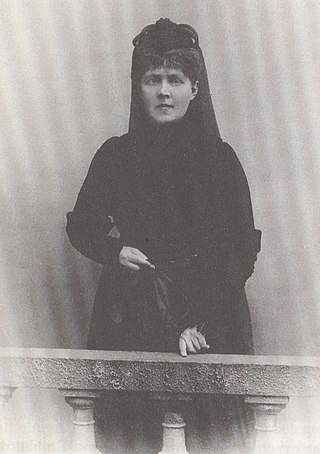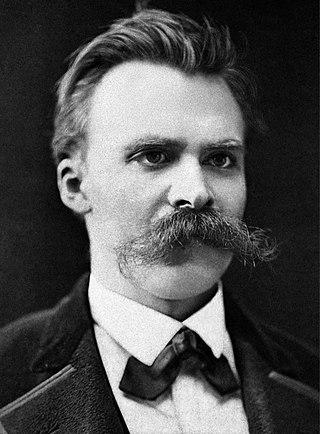Related Research Articles

Eugenics is a set of beliefs and practices that aim to improve the genetic quality of a human population. Historically, eugenicists have attempted to alter human gene pools by excluding people and groups judged to be inferior or promoting those judged to be superior. In recent years, the term has seen a revival in bioethical discussions on the usage of new technologies such as CRISPR and genetic screening, with heated debate around whether these technologies should be considered eugenics or not.

Misogyny is hatred of, contempt for, or prejudice against women or girls. It is a form of sexism that can keep women at a lower social status than men, thus maintaining the social roles of patriarchy. Misogyny has been widely practised for thousands of years. It is reflected in art, literature, human societal structure, historical events, mythology, philosophy, and religion worldwide.

Nihilism is a family of views within philosophy that rejects generally accepted or fundamental aspects of human existence, such as knowledge, morality, or meaning. The term was popularized by Ivan Turgenev and more specifically by his character Bazarov in the novel Fathers and Sons.
Postmodern philosophy is a philosophical movement that arose in the second half of the 20th century as a critical response to assumptions allegedly present in modernist philosophical ideas regarding culture, identity, history, or language that were developed during the 18th-century Age of Enlightenment. Postmodernist thinkers developed concepts like difference, repetition, trace, and hyperreality to subvert "grand narratives", univocity of being, and epistemic certainty. Postmodern philosophy questions the importance of power relationships, personalization, and discourse in the "construction" of truth and world views. Many postmodernists appear to deny that an objective reality exists, and appear to deny that there are objective moral values.

Martin Heidegger was a German philosopher who is best known for contributions to phenomenology, hermeneutics, and existentialism. He is often considered to be among the most important and influential philosophers of the 20th century.
Essentialism is the view that objects have a set of attributes that are necessary to their identity. In early Western thought, Plato's idealism held that all things have such an "essence"—an "idea" or "form". In Categories, Aristotle similarly proposed that all objects have a substance that, as George Lakoff put it, "make the thing what it is, and without which it would be not that kind of thing". The contrary view—non-essentialism—denies the need to posit such an "essence'".

Rollo Reece May was an American existential psychologist and author of the influential book Love and Will (1969). He is often associated with humanistic psychology and existentialist philosophy, and alongside Viktor Frankl, was a major proponent of existential psychotherapy. The philosopher and theologian Paul Tillich was a close friend who had a significant influence on his work.

Other is a term used to define another person or people as separate from oneself. In phenomenology, the terms the Other and the Constitutive Other distinguish other people from the Self, as a cumulative, constituting factor in the self-image of a person; as acknowledgement of being real; hence, the Other is dissimilar to and the opposite of the Self, of Us, and of the Same. The Constitutive Other is the relation between the personality and the person (body) of a human being; the relation of essential and superficial characteristics of personal identity that corresponds to the relationship between opposite, but correlative, characteristics of the Self, because the difference is inner-difference, within the Self.
Existential psychotherapy is a form of psychotherapy based on the model of human nature and experience developed by the existential tradition of European philosophy. It focuses on concepts that are universally applicable to human existence including death, freedom, responsibility, and the meaning of life. Instead of regarding human experiences such as anxiety, alienation and depression as implying the presence of mental illness, existential psychotherapy sees these experiences as natural stages in a normal process of human development and maturation. In facilitating this process of development and maturation existential psychotherapy involves a philosophical exploration of an individual's experiences while stressing the individual's freedom and responsibility to facilitate a higher degree of meaning and well-being in his or her life.

Therese Elisabeth Alexandra Förster-Nietzsche was the sister of philosopher Friedrich Nietzsche and the creator of the Nietzsche Archive in 1894.

Sarah Kofman was a French philosopher.

In classical psychoanalytic theory, the Oedipus complex refers to a son's sexual attitude towards his mother and concomitant hostility toward his father, first formed during the phallic stage of psychosexual development. A daughter's attitude of desire for her father and hostility toward her mother is referred to as the feminine Oedipus complex. The general concept was considered by Sigmund Freud in The Interpretation of Dreams (1899), although the term itself was introduced in his paper A Special Type of Choice of Object made by Men (1910).

Friedrich Nietzsche's views on women have attracted controversy, beginning during his life and continuing to the present.

Women in Australia refers to women's demographic and cultural presence in Australia. Australian women have contributed greatly to the country's development, in many areas. Historically, a masculine bias has dominated Australian culture. Since 1984, the Sex Discrimination Act 1984 (Cth) has prohibited sex discrimination throughout Australia in a range of areas of public life, including work, accommodation, education, the provision of goods, facilities and services, the activities of clubs and the administration of Commonwealth laws and programs, though some residual inequalities still persist.

"Think of the children" is a cliché that evolved into a rhetorical tactic. In the literal sense, it refers to children's rights. In debate, it is a plea for pity that is used as an appeal to emotion, and therefore may become a logical fallacy.
Indigenous feminism is an intersectional theory and practice of feminism that focuses on decolonization, Indigenous sovereignty, and human rights for Indigenous women and their families. The focus is to empower Indigenous women in the context of Indigenous cultural values and priorities, rather than mainstream, white, patriarchal ones. In this cultural perspective, it can be compared to womanism in the African-American communities.
Lisa Bortolotti is an Italian philosopher who is currently professor of philosophy in the Department of Philosophy at the University of Birmingham, United Kingdom. Her work is in the philosophy of the cognitive sciences, including philosophy of psychology and philosophy of psychiatry, as well as bioethics and medical ethics. She was educated at the University of Bologna, King's College London, University of Oxford and the Australian National University, and worked briefly at the University of Manchester before beginning at Birmingham, where she has been a lecturer, senior lecturer, reader and now professor.

Eugenic feminism was a component of the women's suffrage movement which overlapped with eugenics. Originally coined by the eugenicist Caleb Saleeby, the term has since been applied to summarize views held by some prominent feminists of the United States. Some early suffragettes in Canada, particularly a group known as The Famous Five, also pushed for eugenic policies, chiefly in Alberta and British Columbia.
Chiara Bottici is an Italian philosopher, historian of philosophy and writer.

The Blood of the Vampire is a Gothic novel by Florence Marryat, published in 1897. The protagonist, Harriet Brandt, is a mixed-race psychic vampire who kills unintentionally. The novel follows Harriet after she leaves a Jamaican convent for Europe, and her ill-fated attempts to integrate with Victorian society.
References
- ↑ "New 2018 ARC Future Fellow Joanne Faulkner". Macquarie University. Archived from the original on 5 March 2019. Retrieved 17 June 2018.
- ↑ "Joanne Faulkner". The Conversation. 11 May 2011. Retrieved 25 August 2015.
- ↑ "Executive Committee". Archived from the original on 2 March 2019. Retrieved 24 August 2015.
- ↑ "Eugenics Archives". Eugenics Archives. Archived from the original on 13 August 2015. Retrieved 25 August 2015.
- ↑ O'Brien, Susie (14 December 2010). "Author Joanne Faulkner Says Parents Should Get Real on Santa Instead of Lying to Kids". Herald Sun. Retrieved 25 August 2015.
- ↑ Lyttleton-Smith, Jennifer (1 May 2012). "The importance of being innocent: why we worry about children". Gender and Education. 24 (3): 345–346. doi:10.1080/09540253.2012.670393. ISSN 0954-0253. S2CID 143693390.
- ↑ Saunders, Alan (19 March 2011). "The Age of Innocence". The Philosopher's Zone. Archived from the original on 3 February 2012. Retrieved 25 August 2015.